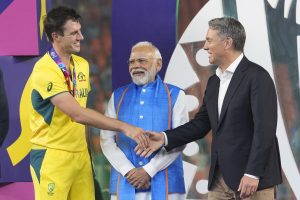Indian Prime Minister Narendra Modi may have felt a bit disappointed when he found himself sharing the frame with Australian Deputy Prime Minister Richard Marles while handing the ICC Cricket World Cup 2023 trophy to the winning captain.
Modi is known for his desire to command undivided attention during high-profile situations. So it is likely that the act of sharing the spotlight with another prominent figure during what was undoubtedly the most anticipated moment following a 46-day extravaganza didn’t go down well with him.
Needless to say, he hardly had a choice, given that the victorious captain, Pat Cummins, was an Australian, and not Modi’s compatriot. Hence, Modi couldn’t help involving the Australian deputy prime minister during the pivotal moment.
But things could have been much different had the recipient been the Indian captain, Rohit Sharma.
Just picture this: Modi, wearing the widest smile possible holding the trophy aloft, without any “third party” involved. Modi would pat Sharma on the shoulder, before theatrically passing the trophy to him, with fireworks and a sea of blue (and saffron, too) illuminating the background. And all this would have taken place inside an enormous sporting facility named after the prime minister.
Regardless of the apparent optics, it would have been as much a victory for Modi as for Sharma. The symbolic significance of this would soar to new heights, silently conveying that reaching the pinnacle of the world is achievable for India – but only under Modi’s able leadership.
And Modi could easily leverage this image as the go-to visual during his forthcoming electoral campaign in an attempt to ensure a third term in office.
But that’s not what happened. Thanks to Australia’s upset win, the World Cup eventually turned out to be somewhat a wasted opportunity for Modi and his Bharatiya Janata Party (BJP), despite its initial acclaim as “the greatest interactive electoral campaign of all time.”
At one point, there was even speculation suggesting that if India emerged victorious, Modi might consider calling for elections approximately six months before the BJP’s term concludes in June 2024.
However, following the final in Ahmedabad, where India suffered a 6-wicket defeat to Australia on November 19, that possibility appears more remote than ever.
Nevertheless, Modi still had some tremendous takeaways from the event. Many have already given their verdict of the World Cup as a successful stage show for Modi’s domestic politics, akin to how hosting the G-20 summit in September played into his global aspirations.
Modi, advocating for a permanent seat on the U.N. Security Council for India, depicted the G-20 as a diplomatic rite of passage for his nation. However, in spite of Modi’s images gracing posters along the streets, the G-20 had minimal influence on the lives of everyday Indians.
This changed amidst the excitement and media focus on the World Cup over the past one and a half months.
The BJP, led by Modi, also wielded a direct influence on the Board of Control for Cricket in India (BCCI) and the organization of the World Cup through Jay Shah, the 35-year-old secretary of the party. Shah, the son of Amit Shah, India’s powerful home minister and a key ally of Modi, played a pivotal role in overseeing the coordination of the event.
While the ICC officially orchestrated the World Cup, Shah’s prominent role as a spokesperson and key figure for the event highlighted the political entanglement surrounding the decisions related to the tournament. This ranged from scheduling to venue choices, contributing to the perception that political considerations played a significant role in the cricketing affairs of the nation.
For instance, aside from hosting the opening and final matches, the Narendra Modi Stadium strategically accommodated high-profile encounters such as India-Pakistan and Australia-England. This ensured that the name “Modi” consistently occupied the spotlight throughout the entirety of the tournament.
Conversely, the BCCI’s choice to exclude Mohali, a city that hosted memorable World Cup matches in 1996 and 2011, was perceived by some as a deliberate omission directed at Punjab, which elected one of the BJP’s political rivals to power in the state elections last year.
Modi and his party had amassed substantial “political capital” well before the tournament commenced.
India’s impressive 10-match winning streak leading up to the final only bolstered Modi’s “cricketwashing” agenda.
Now that India failed to secure the ultimate title, will it have any adverse effect on Modi and his party? Definitely not. The responsibility for the loss squarely rests on the team members and staff.
But what if India won? That victory would undoubtedly be attributed in part to Modi’s personal brilliance. It also would have provided the prime minister with an exclusive photo frame to cherish for the remainder of his life. While the final loss didn’t hurt Modi, it does represent an opportunity cost, as a win would likely have helped him.
With that outcome not materializing, it’s reasonable for Modi to feel a temporary sense of disappointment.

































